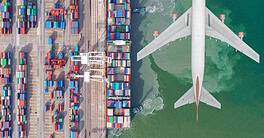The drive to innovate is getting stronger as countries look to ease their reliance on oil revenues.
|
Middle East Innovators 2018 | |
|---|---|
|
Financial Innovator |
Emirates NBD |
|
Corporate Innovator |
Emirates Airline |
|
Individual Innovator |
Omar Christidis |
The tech sector in the Middle East region including North Africa is thriving, with over $650 million invested in digital start-ups last year. Beirut-based research network Arabnet’s State of Digital Investments report states that 2017 was an “impressive” year, with 272 deals. Over the past five years, investments show a compound annual growth in value of 35%, suggesting newly created companies are expanding. While hardware startup success stories do exist, regional innovation is focused on soft tech, as Web platforms and mobile applications require substantially less R&D and capital injection.
But technology does not equal innovation. So far, the region’s most successful start-ups fall under the “me too” category—they adapt an existing innovation to the local market. Online marketplace Souq—recently acquired by Amazon for $580 million—is a prime example; another is Careem, a local version of Uber that closed a $500 million round last June. On a smaller scale are Emirati shipping company Fetchr and Lebanese music-streaming platform Anghami.
Yet there is innovation in adaptation to meet the needs of the local market, too. For instance, in this region, where postal addresses are rare in some places, Fetchr, which uses GPS, is more efficient than DHL. Where Internet service is slow, Anghami works better than Deezer or Spotify.
The Middle East has not been a hotbed of innovation so far, spending little on research and development. In recent years, MENA countries allocated an average of only 0.39% of GDP to R&D, compared to 1.9% in the OECD, 2.5% in the US and 3.5% in Japan. “A 70-year addiction to oil has resulted in a long-running lack of investment in research and development,” Nicolas Sehnaoui, chairman of UK Lebanon Tech Hub and former Lebanese minister of telecommunications, commented in an op-ed. “Without more investment in research, producing world-beating technology companies will be very hard.”
Paltry R&D spending is reflected at the university, institutional and corporate levels. The best university in the region, Saudi Arabia’s King Fahd University, ranks only 173 on the 2018 QS World University Rankings. Similarly, only one MENA-based company makes it to the top 1,000 R&D corporate spenders listed in PwC’s annual Global Innovation study.
That’s changing now. More countries are laying out plans to diversify their economies—and bolstering support for innovation. Recent examples include Oman’s $200 million technology fund and Bahrain’s $100 million start-up fund. Myriad noncorporate private institutions—such as venture-capital funds, accelerators and incubators—have mushroomed all around the region. What’s more, only 12% of the companies funded in the past five years have shut down. “This low failure rate could be due to many different factors: the many private and public-sector initiatives to support and fund start-ups, the reluctance of investors to stop supporting their portfolio companies and the stigma associated with failure,” concludes the ArabNet report.
This picture worries the World Bank. “There are signs that a start-up bubble may be forming, distorting the ability of the ecosystem to select the best start-ups and generate success stories that are sustainable over time,” warns the World Bank in its 2017 Tech start-up ecosystem in Beirut report.
Corporate leaders are validating Middle East startups with money, too. The UAE’s Emaar Malls purchased 51% of digital fashion retailer Nasmhi for $151 million; Saudi Al Tayyar Travel Group invested $10 million in UAE-based car-hailing platform Careem; and Saudi telecom Etihad Etisalat has committed undisclosed amounts to Lebanese music-streaming platform Anghami and Emirati shipping service Fetchr.
“This is huge. It means that corporate investors are prioritizing innovation and engaging with start-ups at strategic level,” says Omar Christidis, founder and CEO of ArabNet. “Large companies are going to be more open to becoming clients of start-ups, and in the future we will see more mergers and acquisitions.”
Established Middle East companies are also funding their own innovation and innovation-investment programs. In 2017 alone, Saudi Telecom announced its $500 million ST Ventures, and UAE based giants Majid Al Futtaim and Crescent Petroleum said they would invest $250 million and $150 million, respectively, in start-ups. “The nature of innovations will evolve as start-ups will look to solve the corporates’ problems,” adds Christidis.
Visioning And Visionaries
If there is any vision for innovation across the Middle East, Omar Christidis is the man behind it. Born in Lebanon, Christidis studied at Yale and worked as a financial consultant in the US. He lost his job in 2008 following the financial crisis and returned to Beirut, where he set up the region’s first digital start-up tech hub. Since 2009, the ArabNet network has worked on conferences, start-up competitions, publications, studies, data analysis, sponsorships, corporate partnerships and much more to push for dynamic digital entrepreneurship throughout the region. This makes Christidis one of the leaders of innovation in the Middle East, and our individual honoree for the region.

Omar Christidis: facilitating entrepreneurship across the region |
Gulf-based financial institutions are among the first to embrace innovation. Most commercial banks have long since invested in digital services such as mobile payments, online transactions and contactless credit cards. But one bank in particular is taking things a step further. In 2017, Emirates National Bank of Dubai (NBD), Dubai’s largest bank, committed to a three-year, AED 1 billion ($272 million) digital-transformation plan. The institution is enhancing back-end and frond-end processes to ensure a premium customer experience based on secure technology. Keeping a close eye on innovation outside its doors, the bank set up its own Future Lab, to support start-ups and nurture talent.
Last year, Emirates NBD was able to roll out a range of new products, including the region’s first blockchain-backed checkbook, the first private cloud-platform, and FaceBanking—a video portal that connects customers to bank advisers for video talks 24/7. In 2017, Emirates NBD also introduced Liv., a mobile-only bank designed to target millennials. Since the launch, the bank says the service has attracted over 10,000 new customers each month, making it the fastest-growing bank in the UAE.
Emirates NBD was awarded Most Innovative Financial Services Organization of the Year by the Bank Administration Institute in 2017. “As we continue to lead the region’s banking sector, I look forward to announcing more technology firsts over 2018 and beyond,” commented Abdulla Qassem, group chief operating officer of Emirates NBD. For its consistent deployment of new technologies, Emirates NBD is our pick this year for Financial Institution Innovator—Middle East.



